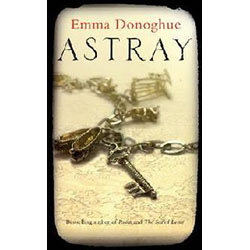 Published: 2012
Published: 2012
Author: Emma Donoghue
A wonderful treasure trove of narrative delights

One of the best books that I’ve read in the last couple of years was Emma Donoghue’s amazing Booker nominated Room – the story of a young woman kidnapped and imprisoned and her son, a child has only ever known life in one small room. I adored the book and was thoroughly impressed by Donoghue’s writing and imagination. An imagination which has produced Astray, a short story collection which is as different to Room as is possible.
In 14 short stories, all of which are based on fact, Donoghue imagines a selection of journeys to, from and within North America. The stories cover four centuries and the range of journeys possible – some are physical journeys from the United Kingdom to Canada, others are metaphorical journeys with characters discovering truths about themselves and their families.
All life is contained here from the very first story which centres on the purchase of Jumbo the Elephant from London Zoo. Other stories include that of an Irish couple who emigrate separately to Canada, a young solicitor attempting to help a wealthy young widow (and himself) and a slave and plantation owner’s wife who decide to run away together. Every story, despite being only a few pages long tells a much larger story and together they build a history of two young and developing nations.
As is normal in any short story collection, some of the tales are more effective and enjoyable than others. My particular favourites are The Hunt – a harrowing story of a young soldier participating in the rape of women during the Civil War and The Gift – letters to an adoption agency from a woman who gave up her daughter for adoption and the man who adopted the child. I wasn’t quite so keen on Snowblind, about two prospectors and The Long Way Home about a pioneer woman returning an errant husband to his home.
I hadn’t quite realised until I finished the first couple of stories that all of the tales contained in Astray were based in fact. Donoghue includes a paragraph at the end each story which explains the historical basis of what has preceded. I was completely bowled over by how she took tiny snippets of fact and turned it into a gripping short narrative. In some cases the information that Donoghue was working with was little more than a long-forgotten regional newspaper report. It is a sign of what an inventive and imaginative writer she is that this is such an accomplished collection.
This is a wonderful book, full of narrative treasures and I heartily recommend a day spent wandering around a beautiful park (in my case Dublin’s Botanic Gardens) taking frequent breaks to read another wonderful story. I doubt you’ll have a better day all summer.
